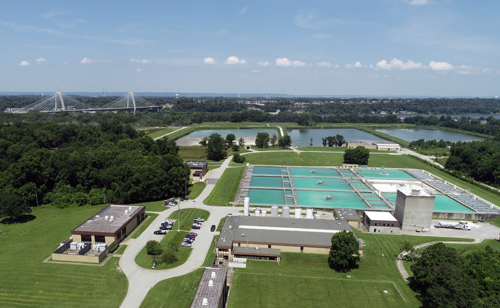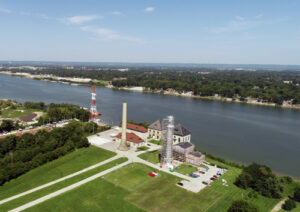 Only about 2.5% of the water on our planet is fresh water. Using it responsibly is vital to the health of our communities, our farms, our environment, and our economy.
Only about 2.5% of the water on our planet is fresh water. Using it responsibly is vital to the health of our communities, our farms, our environment, and our economy.
With support from the United Nations, the U.S. Environmental Protection Agency (EPA) founded National Water Quality Month in 2005 to recognize the importance of water sources and to promote discussions about what individuals and communities can do to protect them so everyone has safe, clean drinking water.
Louisville Water employees are committed to being good stewards of our sources as we deliver high-quality, great-tasting water to nearly a million people every day. Our pioneering filtration research in the late 1800s provided the foundation for basic water treatment practices now used throughout the country, and we continue to develop treatment innovations with an ongoing commitment to meeting or exceeding state and federal water quality regulations. Our two treatment plants are two of the top 19 in North America. With the Ohio River as our main source, our water is abundant and affordable.
 Louisville Water collaborates with ORSANCO, the Ohio River Valley Water Sanitation Commission, and several other utilities to continuously evaluate river conditions. Strategies include both routine and enhanced water quality monitoring, analyzing contamination threats, evaluating the effectiveness of various treatment methods, and providing information to the community.
Louisville Water collaborates with ORSANCO, the Ohio River Valley Water Sanitation Commission, and several other utilities to continuously evaluate river conditions. Strategies include both routine and enhanced water quality monitoring, analyzing contamination threats, evaluating the effectiveness of various treatment methods, and providing information to the community.
Louisville Water also offers outstanding water quality because our employees perform a wide range of daily tests, maintain our infrastructure, manage water as it moves through the network of pipes to homes and businesses, and take every customer concern seriously.
Here are a few ways you can support the goals of National Water Quality Month:
- Wash your car in a grassy area instead of on a paved surface. Wash water that runs off pavement carries oil, grit, and dirt to nearby catch basins, drainage ditches, and waterways.
- Take used oil and antifreeze to a service station or recycling center.
- Pick up after your pet. Animal waste contains nitrogen, which can remove oxygen from water and harm aquatic life if it reaches streams and rivers.
- Decrease use of fertilizer and pesticides, especially when it may rain soon.
- Delay using washing machines and dishwashers during heavy rain. These appliances could help fill sewers and contribute to overflows.
- Don’t flush expired or unwanted medication down the toilet or pour it down a drain.
- Participate in a stream cleanup.
- Plant trees to prevent soil erosion.
Every little bit helps, and if we all recognize the importance of our water sources, we can ensure clean drinking water is available to everyone for generations to come.

